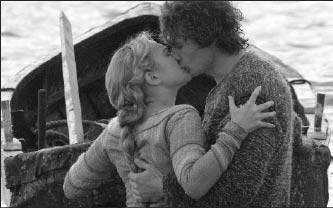Light in the Dark Ages: Tristan + Isolde
by M. Faust

There are those who will like Tristan + Isolde as a historical film with suitable amounts of action, intrigue, suspense and cool medieval sets. There are others who will enjoy the tragedy of two passionate young lovers that gives Romeo and Juliet a run for their money. (You all know who you are.)
As I see it, here’s the chief virtue of Tristan + Isolde: despite being a movie about people who lived during the Dark Ages, when limited access to water, barbers and tailors meant that the average Joe was likely to look pretty much like the average Fred who lived next door; despite being a film about warriors and warring, which involves a lot of indistinguishable guys hacking, kicking and punching each other so fast that its hard to keep track of who’s whacking whom; despite being a film that starts out with an informational crawl explaining the political situation of the time—despite all of this, I was able to follow the story with no difficulty.
This is no small thing. As a rule, I have I trouble following historical plots in the first place. I tend to miss important plot points while I’m busily scribbling a note complaining about why a knight who’s been in a sickbed for weeks is smooth-cheeked while the king goes to his wedding with a five-day growth of beard. I never saw parts two and three of Lord of the Rings because I was completely lost within the first hour of part one. (People like me are the reason why old westerns put black hats on the bad guys and white ones on the heroes.)
You may consider storytelling clarity to be a modest virtue. True. But Tristan + Isolde is nothing if not a modest movie, at least by the standards of historical films these days. It is not an “epic”; though it was produced by Ridley Scott, it was filmed with a limited budget in a restrained period of time. Compared to something like Kingdom of Heaven or Troy, it is a relatively simple story, comprehensible and consistently involving. It is as good as it could hope to be, and in many respects a model of what more movies could be if producers and studios learned to be happy with modest profits instead of squandering money on out of control would-be blockbusters.
For the record, Tristan (a suitably buff James Franco) is the son of a British warlord slaughtered by King Donnchadh of Ireland, who has generally ruled the isles since the departure of the Romans a hundred or so years ago. Tristan has been raised by Lord Marke of Cornwall (Rufus Sewell), a strong but forward thinking sort who realizes that the only way to get out from under the thumb of the Irish is to unite his perpetually squabbling neighbors. Isolde (Sophia Myles) is the daughter of Donnchadh, chafing at her hard life and her father’s notion that she should be given in marriage to one of his generals, a hulking fellow who fails to rouse her interest with smutty talk of yohimbe bark.
Isolde finds Tristan’s apparently lifeless body washed up on the beach after a battle. She nurses him to health in secret, neither knowing the other’s identity. Because both are pure of heart, noble and really hot looking, they fall madly in love, which comes to an end when Donnchadh’s troops chase him back home.
A little sad, but not too tragic. That comes when circumstances bring Isolde between Tristan and Lord Marke. To act on their passion would not only break the heart of the man Tristan regards as a father; it would also destroy what fledgling chance at unity the British face.
Well, there’s no passion like a forbidden one, and this one’s a corker. Still, director Kevin Reynolds (Robin Hood: Prince of Thieves, The Count of Monte Cristo) is content to tell the story rather than working to dazzle us with production design, massive battle scenes and operatic romance. (Wagner already took care of that.) In fact, the climactic battle ends up being what you might call an anti-climactic battle, settled by reason rather than bloodshed.
Myles, in her first leading role, and Franco are nice to look at as well as able thespians, though the actor who gives the whole thing a bit of gravitas is Sewell, whose puppy dog eyes make him so sympathetic that you wonder why he’s generally used in villainous roles.
Come this time next year, no one is going to be putting Tristan + Isolde on their list of the year’s Ten Best Films. But it’s probably a more enjoyable movie than a lot of the films that will be there. It may be a no-brainer, but on a slate of brainless movies that spells a winner to me.
|
Issue Navigation> Issue Index > v5n2: Like Finding Money on the Street (1/12/06) > Film Reviews > Light in the Dark Ages: Tristan + Isolde This Week's Issue • Artvoice Daily • Artvoice TV • Events Calendar • Classifieds |









 Current Issue
Current Issue